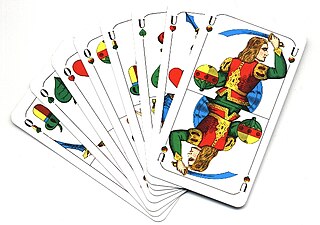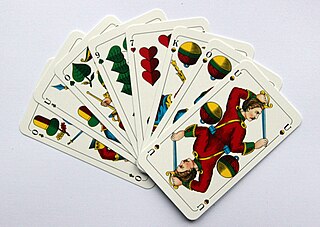
Skat, historically Scat, is a three-player trick-taking card game of the Ace-Ten family, devised around 1810 in Altenburg in the Duchy of Saxe-Gotha-Altenburg. It is the national game of Germany and, along with Doppelkopf, it is the most popular card game in Germany and Silesia and one of the most popular in the rest of Poland. A variant of 19th-century Skat was once popular in the US. John McLeod considers it one of the best and most interesting card games for three players, and Kelbet described it as "the king of German card games."

Schafkopf, also called Bavarian Schafkopf, is a popular German trick-taking card game of the Ace-Ten family for four players that evolved, towards the end of the 19th century, from German Schafkopf. It is still very popular in Bavaria, where it is their national card game played by around two million people, but it also played elsewhere in Germany and in Austria. It is an official cultural asset and important part of the Old Bavarian and Franconian way of life. Schafkopf is a mentally demanding pastime that is considered "the supreme discipline of Bavarian card games" and "the mother of all trump games."
Ramsch, formerly also called Mike in East Germany, is a card game based on the contract of the same name in the popular German card games, Skat and Schafkopf. However, thanks to its interesting mode of play it has since developed into an independent game in its own right which is only loosely based on Skat or Schafkopf. It should not be confused with the games of the Rams family – Ramsen and Ramscheln – that also go by the name Ramsch.

Officers' Skat (Offiziersskat), is a trick-taking card game for two players which is based on the rules of Skat. It may be played with a German or French pack of 32 cards which, from the outset of the game, are laid out in rows both face down and face up. As in Skat, tricks are taken and card points counted to determine the winner of a round; game points are then awarded to decide the winner of a game. It is also called Two-hand Skat, Sailors' Skat (Seemannsskat), Farmers' Skat (Bauernskat), Robbers' Skat (Räuberskat) or Coachmen's Skat (Kutscherskat)

German Schafkopf is an old German card game and the forerunner of the popular modern games of Skat, Doppelkopf and Bavarian Schafkopf. Today it is hardly ever played in its original form, but there are a number of regional derivations.
Schieberamsch is an unofficial contract within the popular German card games, Skat and Schafkopf, but "also makes a good game in its own right." Schieberamsch is a variation of the unofficial Ramsch contract, in which the aim is to score as few points as possible, the difference being that, in Ramsch the skat is left untouched until the end, whereas in Schieberamsch it is passed from player to player with or without an exchange of cards.
Schneider is a term used in many card games for a low card point score that results in boosting an opponent's game score. The threshold is usually half the total points needed for a win; below the threshold, the player or team is Schneider; above it they are 'out of Schneider'. Its natural extension is Schwarz, said of a player or team who loses the game without taking a single trick.

Mucken or Muck is a variation of the popular German card game, Schafkopf. However, unlike Schafkopf, it must always be played in teams of 2 players, so there are no soloist or Rufer ("caller") contracts. Mucken is mainly found in the province of Upper Franconia in the German state of Bavaria. Mucken is often played in Franconian restaurants, as it is part of the Franconian pub culture. The details of the rules vary greatly, even from village to village.

German Rummy or Rommé is the most popular form of the worldwide game, Rummy, played in Austria and Germany. It is a game for 2 to 6 players and is played with two packs of French playing cards, each comprising 52 cards and 3 jokers. There are no partnerships. In Germany, the Germany Rummy Association is the umbrella organisation for local rummy clubs and organises national competitions. The game is often just known as Rommé in Germany and Rummy in Austria.

Binokel is a card game for two to eight players that originated in Switzerland as Binocle, but spread to the German state of Württemberg, where it is typically played with a Württemberg pattern pack. It is still popular in Württemberg, where it is usually played in groups of three or four as a family game rather than in the pubs. In three-hand games, each player competes for himself, while in four-hand games, known as Cross Binokel (Kreuzbinokel), two teams are formed with partners sitting opposite one another. The game was introduced to America by German immigrants in the first half of the 20th century, where it developed into the similar game of pinochle. Binocle was still played in Switzerland in 1994. In south Germany, the game is sometimes called by its Swabian name, Benoggl.

Quodlibet is a traditional card game and drinking game associated with central European student fraternities that is played with William Tell pattern cards and in which the dealer is known as the 'beer king'. It is a compendium, trick-taking game for 4 players using a 32-card pack of double German playing cards.

Solo 66 is a trick-taking, Ace-Ten, card game for five players in which a soloist always plays against the other four. It is based on the rules of Germany's national game, Skat, and is played with a French-suited Skat pack of 32 cards. Bidding is for the trump suit. Jacks are ranked within their respective suits and do not form additional trumps over and above the cards of the trump suit. Grupp describes it as "an entertaining game for a larger group."

Rumpel is a card game, similar to Quodlibet that is native to the Danube region from Regensburg to Linz, but is played especially in the region of Hauzenberg in the German county of Passau. Mala describes a version with 8 or 12 contracts from a menu of 29 called Großer Rumpel.

Bauerchen, also Bauerchens, Bauerspiel, Bauersche or Bauersches, is a trick-taking card game of the Ace-Ten family for four players that is played in the Palatinate region of Germany, especially around the city of Kaiserslautern, as well as in south Hesse. It is often played during leisure times as an alternative to well known games such as Schafkopf or Skat. Regular Bauerchen tournaments also take place. The game is named after its four permanent trumps or "Bowers".

Ramsen or Ramsch is a traditional Bavarian plain-trick, card game for three to five players that is played with a 32-card German-suited pack and is suitable both for adults and for children. It is one of the Rams group of card games that are distinguished by allowing players to drop out if they think they will fail to win the required number of tricks. An unusual feature of Ramsen is the presence of four permanent trump cards that rank just below the Trump Sow (Ace). It should not be confused with the contract of Ramsch in games like Skat or Schafkopf, nor with the related game of Rams which is also called Ramsen in Austria, but is played with a Piquet pack, does not have permanent trumps and has a different card ranking.

Scharwenzel, formerly also called Schipper-Schrill, is a traditional north German plain-trick card game of the Schafkopf family that is played by two teams with two to four players on each team. The game is at least three centuries old and is played today only on the island of Fehmarn in the German state of Schleswig-Holstein. It may be a regional variant of German Solo with which it bears some similarities and it may also have been ancestral to Schafkopf. It is not related to a different game called Scharwenzel or Scherwenzel that was once played in Bavaria.

The following is a glossary of Skat terms used in playing the card game of Skat. Although Skat has German origins, it has now become an international game, often played to official rules. This glossary includes terms which are common or regional, official or unofficial, as well as those used for special situations, starting hands, card combinations and terms relating to players. Many of the terms are also used in other trick-taking or Ace-Ten games or even in card games in general.
Schwimmen or Einunddreißig is a social card game for two to nine players, played with a 32-card Piquet pack, that is popular in Austria and Germany. Although it is also called Einunddreißig, this should not be confused with a predecessor of Siebzehn und Vier (Twenty-One), also called Einunddreißig. Schwimmen is German for "swimming" which refers to the last chance that a player gets before they drop out.

Ramscheln, also called Ramsch, is a German card game for three to five players, which is usually played for small stakes. It is a variant of Mönch and a member of the Rams group of card games characterised by allowing players to drop out of the current game if they think they will be unable to win any tricks or a minimum number of tricks. It should not be confused with Ramsch, an unofficial contract in Skat, played when everyone passes, in which the aim is not to score the most card points.
Skat scoring refers to the method of recording of game points in the card game of Skat. Since it is normal for a number of rounds to be played, not just a single game, there is a need to record and account for the game points won by each individual in order to determine the overall result. A proper scoring system is especially important for the Tournament Skat and Skat played for small stakes.














